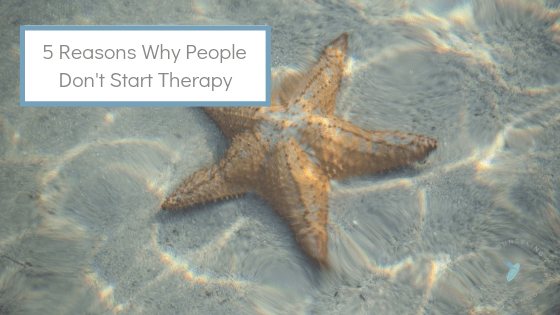Therapy is a big step for most people.
For some, having a loved one suggest therapy may feel like an insult. Despite the progress we’ve made surrounding mental health stigma, it still exists. Many people are quick to see a doctor if they are having nagging back pain but will put therapy off for years for their mental health pain. Below we list five common ideas for what holds people back from seeking help.
1) My problems are not that bad.
Many assume that therapy is only for people who really cannot handle their problems. For many this is the case, however seeking support from a therapist sooner can help you recover quickly and actually prevent potential serious mental health problems. People who start in therapy sooner from the first time they don’t feel okay actually tend to have quicker results and are in therapy for a shorter duration. Additionally, having a perspective can provide a mirror to your challenges and help you learn new ways of coping you never even thought about!
2) A complete stranger isn’t going to help me. They don’t know what I’ve been through.
For many people, having an unbiased person who is only looking out for your best interest can be helpful. It is your job to explain what’s going on and share your own thoughts and feelings about the situation. A therapist will not tell you what to do (unless the situation is violent or dangerous) and they will not give you advice. Our role is to guide you through finding answers and helping you develop a positive view of yourself along the way. You wouldn’t expect your doctor to have cancer if she’s treating you for cancer right? Same thing with a therapist. Your therapist does not have to experience your particular situation or diagnosis to help you. Additionally, even if your therapist has been through similar experiences it is unlikely there will self-disclose that information unless it is necessary to help you. The therapy session is focused on you!
 3) I’m scared about facing myself or being forced to look at aspects of myself I don’t like.
3) I’m scared about facing myself or being forced to look at aspects of myself I don’t like.
Often we avoid the aspects of ourselves that we don’t like. We try to hide and pretend our shame doesn’t bother us. A benefit of therapy is actually gaining a satisfaction and happiness in our lives. By gaining self-awareness you will feel more in control and you will learn more about the positive aspects you bring to the table. If you’re concerned about what you’ll learn, let your therapist know. The therapist will help work at a pace that is comfortable for you. We like to say we start in the shallow end of the pool while you learn to swim and slowly work your way out into the deep end. By the time you get to where you can’t touch, you’ve learned how to swim and feel safe swimming back to shore when you need.
4) I don’t want someone telling what I should and shouldn’t be doing.
You are not alone! In fact we all don’t want people to tell us what to do. Very rarely does positive change happen because someone outside of ourselves told us to change. Change doesn’t happen unless we buy into it and see it as something that is positive in our lives. Suggestions made be made in therapy but they are just that, suggestions. They are not demanding or expectations. A common suggestion in therapy is perhaps speaking kindly to yourself in difficult situations. You can choose to try this our in your life or totally dump it. It’s there when if and when you’re ready. Particularly in the cases of substance abuse issues, a licensed addictions specialist knows the ins and outs of helping a person with motivation and making changes around their use.
5) I feel like they’ll judge me.
It can be vulnerable and difficult to talk about your feelings. It’s completely natural to wonder about what the therapist is thinking or feeling about what you’re sharing. The therapist is there to listen and help you through these problems not judge you. Judgement is not an effective tool for a therapist to use to help you heal or to facilitate change. In fact, your therapist probably is thinking about ways to help, heal, or support you during a challenging time. If you are feeling judged, it’s important to talk about it with your therapist to prevent anything from getting in the way of getting the help you’re seeking.
Most people report therapy has help with:
- increased self-confidence
- increased accept of themselves and the world
- decreased anxiety
- increased ability to make decisions
- decreased problems with drugs and alcohol
- greater power and control in their lives
- improved relationships
- deeper gratitude for their lives and those around them
It’s time to get started now. Recovery works. Therapy works. Living a life full of love through mindfulness and vulnerability is possible. Be authentically you!

